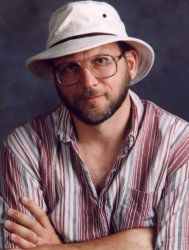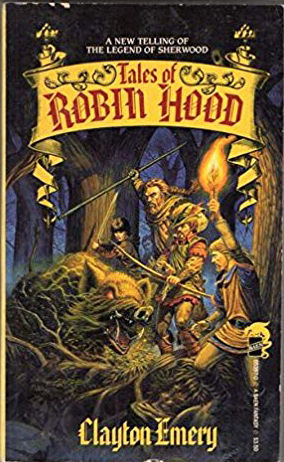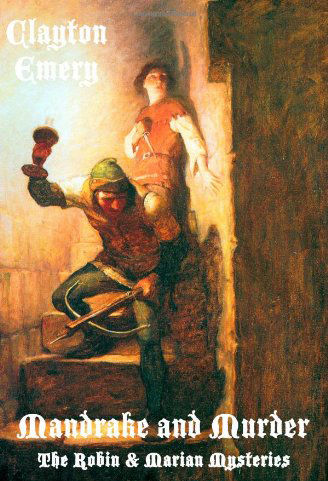Robin Hood's nature and other thoughts
AWW:
Who is Robin Hood for you? How does he act? What does he stand for?
CE:
Good question. Robin Hood is perhaps the best example of the "wrongful"
hero, in that rather than uphold the law, support the establishment, fight
for king and country, he's an outlaw who fights corrupt authority.
There have been other heroes who fought wicked kings and such, but RH is
almost unique in that he dispenses HIS brand of justice in a world ruled
by injustice.
The legends became popular, of course, when common people were upset with
the status quo. Many parts of the church were corrupt, in that they
collected tons of money while lauding poverty. Kings were not necessarily
good, being either absent, too heavy-handed with taxation, or lax in letting
villains ride roughshod over commoners. So of "God's Sacred Triangle"
(or whatever it was called) where nobles defend the body, clerics defend
the soul, and peasants work to support everyone, most peasants could clearly
see that other two sides of the triangle were screwing them. Furthermore,
even God wasn't doing His job. Beginning about 1375, the Black Plague
swept through Europe, and continued to do so in waves for like a hundred
years. People thought they were being punished by God (priests said
so), so they reformed, prayed, sacrificed, even whipped themselves. Nothing
worked, and the plagues continued to kill by the thousands. So some
peasants thought even God was shirking his duties.
Meanwhile, there were stories of this guy, a commoner, hiding the depths
of Sherwood who took money away from corrupt clerics, humiliated
the local sheriffs, enraged nobles, and rewarded honest people of all stripes
with some of his stolen booty. What a concept! A hero of the
people and for the people who does what's RIGHT, not what's legal.
And of course, he's (usually) gentle about it. He doesn't slaughter
his enemies, he strips them and ties them to a horse backwards and sends
them back to suffer embarrassment. Or robs them, leaving them poor
as the people they robbed. Robin Hood is the guy who comes along and thrashes
the local schoolyard bully. He doesn't war to destroy an enemy, he
only seeks to bring back the proper balance, where average folks can work
and enjoy life without fear.
Of course, this "the outsider hero is the only honest man" image has been
repeated over many years. Prince Valiant vowing to destroy an evil
city. Dashing highwaymen robbing with a gun and a grin. Lone cowboy
shooting up corrupt towns. Lone private detective shooting up corrupt
town. Country singers Willie Nelson and Johnny Cash forming a group
called The Outlaws. Outlaw Bikers magazine. Pretty Boy Floyd the
Outlaw, hiding out in the hills of Oklahoma, begging a meal from down-home
folks, then leaving a $100 bill under his plate. Bonnie and Clyde
robbing banks that had conveniently folded and stolen working peoples'
wages.
Nothing sickens common people more than hearing some politician say, "We
did nothing illegal," when in fact he's legally robbed us blind.
Or Woody Guthrie's song goes, "As you travel through this country, You'll
see lots of funny men. Some will rob you with a six-gun, and some
with a fountain pen." Or Dylan's "to live outside the law you have
to be honest."
And Robin Hood has been tweaked for writers' own purposes. A Jewish
television producer is blackballed in 1950s Hollywood, so goes to England
and makes The Adventures of Robin Hood TV show where RH tweaks authority.
RH as hippie. RH as youthful leader rebelling against older entrenched
authoritarians. RH fighting Nazis. RH as a Socialist redistributor
of wealth. Marian as real leader of drunken outlaws. Marian
as feminist freedom fighter. And so on.
So really, Robin Hood as a rebellious hero rebels against whatever large
organization is exploiting common people. Yes, he's a plug-and-play
hero because he does what's RIGHT at a visceral level that people can identify
with. What more do you need in a hero?
AWW:
What were some of your major influences?
CE:
Ummmm, for what? You mean, what do I like to read? Or who am
I trying to copy when I write. ("At one time in this country, there
were only two types of writers: those trying to write like Hemingway, and
those trying not to.") If it's "What do I read?" the answer is all
kinds of adventure, westerns, comic books, mysteries, historical novels,
some classics, etc. (Don't get me started on what a "classic" should be.)
If it's "Who am I trying to write like?", the answer is nobody, or myself.
A long time back I learned that if I tried to write anything fancy, it
turned gloppy real fast. So my "secret" for "finding a style" is
to write as simply and clearly as possible. Any extras (what Twain
called "his little darlings") just get in the way of the story.
And that's what this profession really is -- storytelling. Whether
you're a caveman sitting around a campfire, a professional storyteller
in a Moroccan bazaar, or a "writer" beating on a keyboard. THE oldest
profession.
AWW:
Who is your favourite character from the book?
CE:
All of them. I like Robin Hood, who is a fully faceted person even
in the scanty legend. He displays humor, a quick temper, steadfastness,
kindness, and many other emotions. He's one of the most clearly drawn
characters of legend, if not the most. I like Little John for his
steadfast loyalty, and I've always liked giants (Paul Bunyan, Stumbo, Stormalong,
and others). I like Marian, who's plucky and tough yet feminine.
And all the others, whether they existed before or I created them.
AWW:
What problems have you encountered in writing Robin Hood stories?
CE:
None. I get to read a lot of history and make up adventures.
It's more fun than work, though there's a lot of typing involved.
(Dorothy Parker: "I love writing, it's the paperwork I can't stand!")



Contact Us